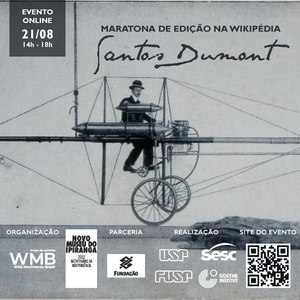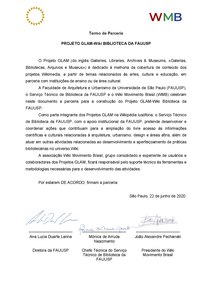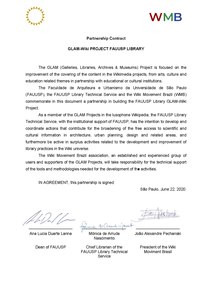GLAM/Newsletter/August 2020/Contents/Brazil report
|
Open innovation and dissemination activities: wrapping up great achievements on a major GLAM in Brazil
Wrapping up the New Ipiranga Museum Wikipedia Initiative

In August, the Wiki Movimento Brasil UG finished after six months the first phase of an important advance in the GLAM Wiki partnership with the Paulista Museum (also known as Ipiranga Museum), one of the major cultural institutions in Brazil.
The project -- called New Ipiranga Museum Wikipedia Initiative -- involved a bold partnership with the board of the museum with open innovation and experimentation of dissemination events and activities throughout 2020 in a context in which the museum is closed for renovation and Brazil is facing the COVID-19 pandemic.
The user group also won a Creative Commons grant for documenting this particular Open GLAM story. We're very excited to share our story with a wider audience! The full text in which we describe all the innovative products, dissemination events and activities we developed will be released on Medium both in English and Portuguese throughout September. In this GLAM Outreach newsletter, to celebrate and share with the wikimedian community, we summarize those achievements.
Gamified apps
Provisionally called Povo Conta and Trajo, these gamified apps allow users to browse items in the collection and participate in their curating metadata in a friendly interface. The former is aimed at inserting data on the number of elements portrayed in the images; and the latter is aimed at identifying clothing elements and accessories portrayed in the images. Both apps are already available for public interaction and encourage community participation in improving the collection’s metadata.
The first semantic web book on Wikibooks

Based on a photographs and postcards collection that portrays the city of São Paulo in the turn of the 20th century uploaded at the beginning of the partnership with the museum, we created the first web semantic book on Wikibooks in Portuguese. That means that each page of the book was created based on Wikidata entries, including the Listeria lists with related images and the subtitles of each photograph, automatically generated through a structured narrative process. The book also allows the user/readers to take part in the improvement of its content through gamified apps of collaborative curation. Check out The photographs of Guilherme Gaensly in the collection of the Paulista Museum to know more.
Reconstruction by images
Another achievement was the use of georeferencing data provided by the museum to improve the accuracy of the location of buildings in São Paulo in the images of a photographs collection of downtown São Paulo between the 1950s and 1960s taken by Werner Haberkorn. We created a process on location metadata refinement and positioning of the photographer at the moment he captured the images to allow visual reconstruction of buildings that no longer exist in São Paulo. This video on YouTube shows how this visual reconstruction takes place.
Collaborative mapping
We have relied on the free map project OpenStreetMap to carry out an internal and external collaborative mapping of the Paulista Museum. The goal was to remodel the museum area available in the project, adding more precision on its coverage, so that both the museum building — an iconic monument in São Paulo — and the building’s internal rooms could have a greater degree of detail in their cartographic representation. Check out this video on YouTube to see the process of improving the mapping of the museum with OpenStreetMap.
Edit-a-thons
The edit-a-thons were initially planned to occur on site, but with the COVID-19 pandemics, we chose to bring it online and take the opportunity to offer lectures on the museum’s collections and tutorials on Wikimedia projects to a wider audience via webinar. After the live broadcast, participants could edit entries on Wikipedia and Wikidata and interact with Wiki Movimento Brasil team via Slack.
Eight editatonas were organized, covering varied themes: Women, Art and History; Indigenous People and the Museum, Struggles for the Independence of Brazil, Photographic São Paulo, The waters of the Paulista Museum, Cartographies and Territories, Scientific Illustration: Taunay and Florence, and Santos Dumont. The videos already have more than 3 thousand views and we have been notified that they are also being used in educational contexts.
Wikidata Labs
In a format similar to editatonas, Wikidata Labs - technical training workshops on tools and resources associated with Wikidata - took place with a webinar followed by a practical activity with the community. There were three Wikidata Labs focused on the collection of the Paulista Museum: the first dealt with the transfer of articles from the journal Anais do Museu Paulista to Wikidata, the second with the educational potential of the database, and the third with relative digital positioning (IIIF), linked to the development of the process of reconstruction by images in the Werner Haberkorn collection.
Wikicontest New Ipiranga Museum
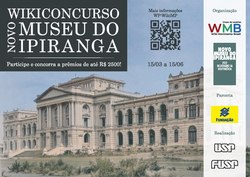
The Wikicontest New Ipiranga Museum was a contest to edit Wikipedia entries associated with the museum’s GLAM-Wiki initiative. For three months, registered volunteer editors improved content associated with the museum and its collection, and those who edited the most won special awards and medals on their user pages. In total, there were 862 registered editors who improved 269 entries, adding 1.3 million bytes. The impact of the activity was tremendous: so far, the entries have received over 2.6 million views.
Some more uploads on Paulista Museum GLAM
- 510 academic articles from the museum journal Anais do Museu Paulista on History and Material Culture. Available on Wikimedia Commons here.
- 1340 metadata on the 4th Centenary of São Paulo and the Affonso Taunay collections on Wikidata.
August events and partnerships
Wikicontest with the Brazilian National Archives

As mentioned in the previous Newsletter, WMB is holding a second wikicontest on Wikipedia in Portuguese with a significant cultural institution in Brazil.
This time, Brazilian editors improved and created entries related to Brazil’s capital, Brasília, on Wikipedia and used part of the 10 thousand images of the Brazilian National Archives collection uploaded on commons through the GLAM partnership ongoing since 2017.
This is one of the biggest and most important Wiki Movimento Brasil events and it will be concluded on September 14. In its last week, the contest has already reached the mark of 183 created articles, more than 700 edited pages and 4.54 million bytes added, according to the event's page on Outreach Dashboard.
In the coming weeks, the event will award cash prizes to the top five finishers. The end of the competition promises to be tough!
Edit-a-thons and workshops
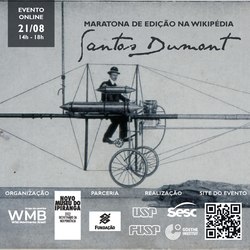
On August 21, we had the 8th and the last edit-a-thon of a series in partnership with Museu Paulista. For this event, WMB uploaded a batch of images and metadata to Commons and Wikidata from the Santos Dumont collection.
In addition to the live presentation and workshop, the event also showed first hand the gamified app Trajo, which identifies clothing elements and accessories portrayed in the images. After the lecture, 14 editors improved 281 pages and created 11 more.
In September, WMB intends to revise and further improve the metadata for the Santos Dumont collection, through a project on Wikidata, accompanied by the Dashboard.
At the end of August, WMB was also very happy to help organize one of the most diverse and inclusive events ever held by the group. Together with the collective NaPupila, this event was designed to improve and create articles on Wikipedia in Portuguese about trans people or about sensitive issues to this community, in order to integrate it better into the Wikimedia universe.
In this event, 22 editors created 18 articles and edited more than two thousand pages, with more than 179 thousand bytes added.
This was the fourth edit-a-thon in partnership with NaPupila collective and Art+Feminism, in the Arts+Feminisms in Lusophony 2020 Campaign, and first event with Brume Dezembro and Secec/RJ.
The month of August was also full of WMB activities with Abre-te Código, the Brazilian version of Coding da Vinci hackathon. For the event, the group team developed two written materials, one on how to make a GLAM-WIki and one about Wikimedians in Residence, and one video on GLAM-Wiki partnerships. All of these materials were aimed at Brazilian GLAM institutions that are interested in sharing their collections openly online.
This was part of the formative cycle of the Abre-te Código project, in partnership with Goethe-Institut São Paulo. Registration will be open by the end of September for the online hackathon in October.
A new library partnership
In the last Newsletter, the GLAM Bibliotecas da USP partnership was officialized with two important libraries: Biblioteca Carlos Benjamin de Lyra, from the Institute of Mathematics and Statistics, and Biblioteca da ECA, from the School of Communications and Arts.
This month, we are thrilled to officially announce the partnership with the Biblioteca da FAU, from the Faculty of Architecture and Urbanism. Right below are the ratification documents, available on Wikimedia Commons in Portuguese and English.











